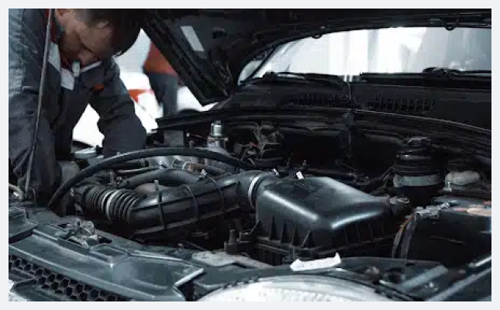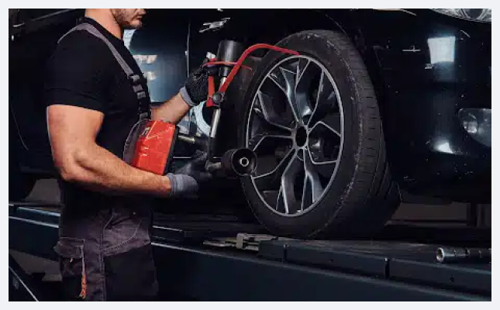Brakes are a car’s most crucial component, resulting in the driver’s and passenger’s direct safety. It also depends upon your driving and the other prevailing conditions affecting the brake’s needs. Several signs will indicate the brake pads are beginning to wear out; pay little attention, and you will be able to identify the symptoms indicating worn-out brakes well in advance.
Worn-out brakes might make the difference between a close call and a major collision (or worse).
So, how can you know if you need new brakes? Fortunately, worn brakes don’t stay silent for long, and there are a few frequent warning signs to check for. Today, we’ll show you how to recognize your brakes’ indications.
Pay attention to these warning indications; your vehicle requires new brakes as soon as possible.
Your brake pads are making squealing noises.
When your brake pads are worn down, they will make squealing noises when you apply them. When your brake pads wear out, it’s usually time to replace them. If you hear much squealing from your brakes, check them to avoid more significant problems down the road.
Brakes should be replaced before they wear down too far and expose the metal backing underneath all brake shoes. If this happens, you won’t have any way to slow down or stop your vehicle, which could cause an accident while driving on busy roads with other cars around you.
If you hear a squealing noise while applying brakes, it’s time to check them out. This is especially important if the squealing is accompanied by a grinding noise or other unusual sounds from your vehicle’s braking system.
Your vehicle is taking longer to stop.
A brake’s effectiveness is determined by the amount of friction that’s generated between its components. When you apply your brakes, wear causes the pads to compress against the rotor, creating a layer of conflict that slows and stops your vehicle. When this layer wears down, it becomes less effective at controlling your vehicle and increases the risk of skidding or rolling over in an emergency stop.
When you first notice any change in how quickly or effectively your brakes are working, it may be time to replace them. If they don’t seem to be working as they did when they were new, there may be something wrong with them—and that could put other drivers on the road (and themselves) at risk if left unattended.
You can see a brake pad warning light on your dashboard.
If you see a warning light on your dashboard, it’s time to get new brake pads. Brake pads are made of friction material that grabs onto the metal backing and presses against your car’s rotor when you press down on the brake pedal. Over time, this metal backing wears out first and needs to be replaced before you can return your brake shoes.
Regarding how often they need replacement, it depends on how much driving you do per year and what type of driving conditions (such as cold weather) affect your braking performance more than others. Most people need new brakes every 40-50 thousand miles because their cars are driven in average weather conditions for about that amount of time each year; however, if you live in an area with extreme winters or summers, then this estimate may vary based on the climate where you live.
If you need new brake pads, it’s essential to make sure that you replace them with the correct kind. Some cars have different types of brakes, including disc and drum brakes. If you need to know your car’s type, ask a mechanic or look online for information about your model.
Your brake pedal feels soft or spongy.
If you notice that the brake pedal feels soft or spongy, it could mean that the brake pads have worn down and need to be replaced. A firm pedal should indicate that the car is stopping well. If your pedal sinks when you press down on it, this may mean that a calliper is sticking and not releasing properly. The brake pedal should also be firm under braking—not wobbly or pulsing.
If you have to press hard on the brake pedal for an extended period before the car comes to a stop, this may indicate that there is air in your brake system. If you’re driving at high speeds and your brakes feel like they have no effect, could it mean that there is not enough pressure being applied to them by the master cylinder?
You can feel vibrations in the pedal and steering wheel when braking.
If you’re experiencing vibrations in the steering wheel or brake pedal, your current brakes are worn out. The rubber on the brake pads is wearing away too quickly and needs to be replaced. If this happens frequently, it may be time to get new brake pads before they wear out completely and cause irreparable damage to other parts of your car, like rotors or drums.
If you hear squealing noises when braking, something may have become stuck inside the callipers—the parts of your car that squeeze together when applying pressure with brakes applied—and needs to be cleaned up before being used again (like sandpaper).
It’s also possible that the brake pads are worn out and must be replaced. If you hear grinding noises when braking, your rotors are likely damaged—the parts of your car where the brake pads meet so that they can squeeze together when applying pressure with brakes.
Brake pads don’t last forever, and they may show these warning signs when they need replacing.
Brake pads should be replaced every 48,000 km. If you drive more than that per month, it’s a good idea to check the wear on your brakes monthly. Check each pad’s wear by pushing it down with your hand and then lifting it (it shouldn’t move). If it moves when pressed down or there’s no resistance when pressing down on it, then you’ll need to replace them as soon as possible because that sign means that they’re already worn down beyond what’s considered safe for driving. You’ll also want to replace them if they make squealing noises while driving or after stopping from high speeds like highway driving or going down steep hills—this is another sign that they’re worn out and need replacing soon.
Brakes are an essential part of your vehicle and should be checked regularly. If you notice any issues, it’s best to get them looked at by a professional mechanic as quickly as possible.


WHEN OFTEN DO YOU OPT FOR BRAKE REPLACEMENT OR REPAIRING?
If you hear any of these signs, it’s important to get your brakes checked by brake specialists Melbourne. Your vehicle’s performance and safety depend on how well its brakes work. In addition, you want to avoid getting in an accident because of faulty brakes! If you’re unsure whether it’s time for new pads, bring your car into our auto repair shop so we can check out what’s going on under the hood. The technicians here will tell you if those squealing noises mean an expensive replacement or just some routine maintenance that needs to be done soon.
WHY CHOOSE BCS PRESTIGE FOR BRAKE REPLACEMENT SERVICES?
We offer a range of European car services in Melbourne, including car maintenance, brake replacement and transmission repair. As specialists in European cars, we support anything from high-performance to standard models and luxury vehicles.
Our trained and skilled professionals offer unmatched craftsmanship in delivering high-quality services. We thoroughly inspect your car’s braking system and suggest repairs using the latest technology and state-of-the-art diagnostic equipment.
CONCLUSION
Don’t wait if you see, hear, or feel any of the above indicators that your BMW’s brakes require repair from professional BMW mechanics Melbourne. Simple issues, such as worn brake pads, can add up quickly. Of course, a properly functioning braking system is critical to your safety.
Of course, the make and model of your car will also influence your brake maintenance routine. Fortunately, your owner’s manual contains broad guidance for these and other regular maintenance activities. With that in mind, inspect your brakes every 8,000 km and consult with a competent workshop.
At BCS Prestige, we’ve been caring for cars for several years. We specialize in brakes, alignments, complete engine repair, smog inspections, oil changes, and much more, so call or stop by our BCS Prestige Workshop for further details.




































